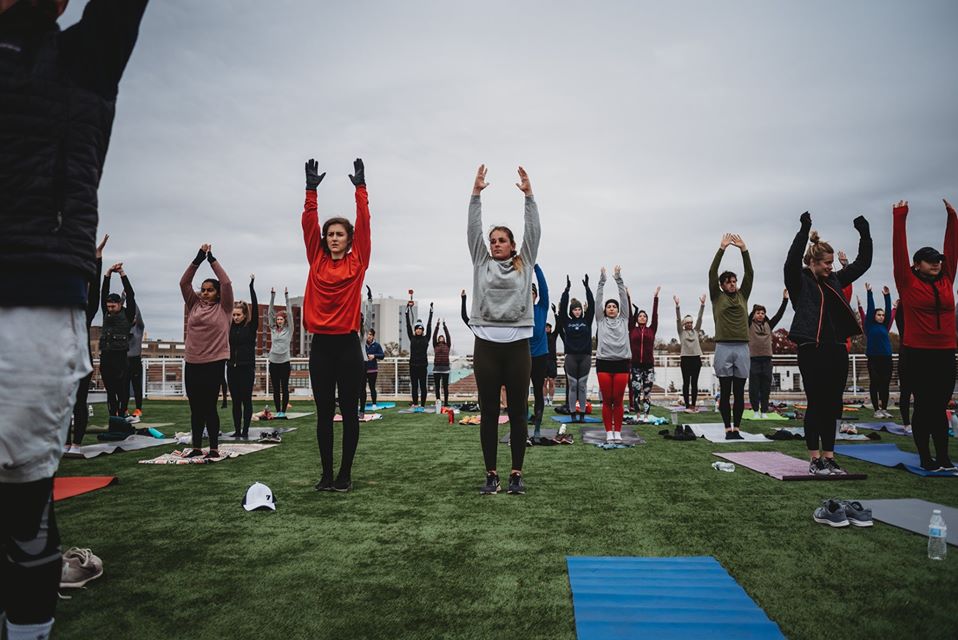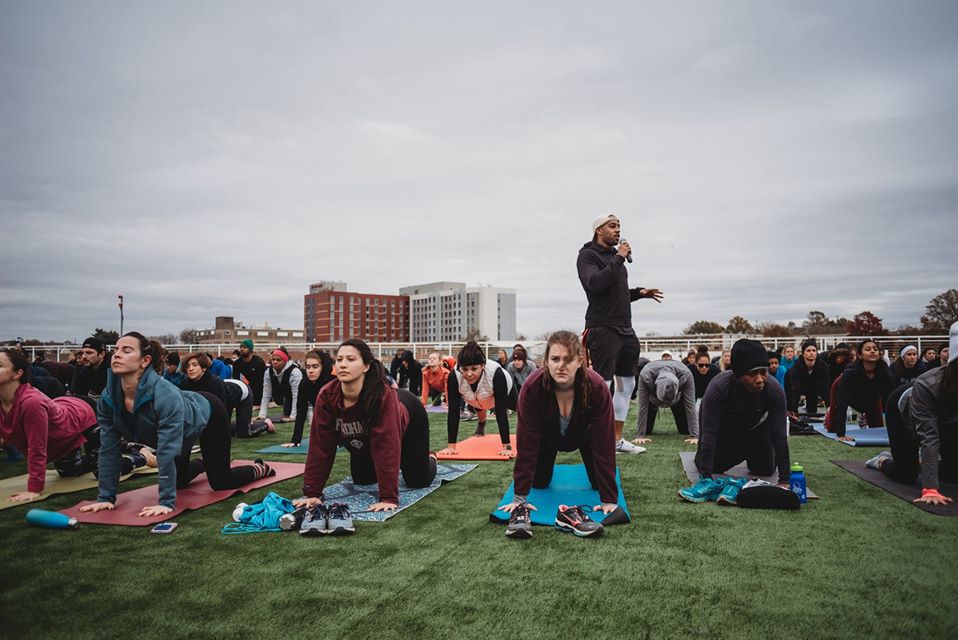Fighting Burnout: If You Don’t Take a Break, Your Brain or Body Will Make You

But do I have to go to class?
The thought comes out of nowhere, as if someone else said it. Your workout, once the absolute highlight of your day—your escape from emails, deadlines, and conference rooms—suddenly feels like a chore.
No, I have to workout—otherwise this day will be hell.
You grab your grippy shoes and head for the door, ignoring all blaring signs of physical fatigue and mental exhaustion. Like brushing your teeth or scanning the headlines, your workout becomes the next box you have to check.
But once on the turf, you find yourself going through the motions. You pick up the same 30 pound weights you picked up three months ago (even though logic tells you you’re stronger) and jog at the same, comfortable pace down the lane.
This isn’t you, you think. You’re competitive, driven, and even on your most unmotivated day, usually find yourself snapped into action by shouts from your teammates. But you dismiss the possibility that maybe you could use a day off, convinced that the only way to get through a tough workweek is through an even harder workout.
Every last one of us—down to every coach, G.O.A.T., and even our two owners—can relate to this mental battle. And no matter what those shitty voices in your head may lead you to believe, you’re not losing your edge.
You’re just burnt the f/ck out. And being burnt out has real physical, mental, and emotional repercussions you have to respect.
IN MOST WAYS, STRESS CAN BE A GOOD THING
It’s good to push yourself to the limit, both physically and mentally. It’s good to pull long hours because you can’t pull away from a job you love. It’s good to be surprised by your physical strength (and yes, we purposely stress your body inside the studio).
But there is a fine line between testing your limits and pushing past your breaking point.
“The people who burn themselves out at work are the same people who burn out their bodies,” says Cut co-owner Chris. “We know because that mentality describes almost every high performing person at this gym.” The masochist in you goes at breakneck speed, overtraining in your workouts and grinding through 60+ hour workweeks.
And the scary part is that no matter how stressed out you get, you keep going because long ago you taught yourself to power through it.
BUT IF YOU GO TOO LONG WITHOUT REST, EVENTUALLY THAT REST WILL COME ANYWAY

“You have a choice,” says Chris, “Either you take a break yourself, or your mind and body will make you. And it’s a lot less fun when a break is forced upon you.”
If you don’t strategically implement rest, ignoring all warning signs that you need a day off, eventually that rest will come anyway. Physically, you get hurt; mentally, you become angry, closed off, and find yourself unable to enjoy things you once loved (including your workouts). And while a physical injury can land you in Lauren’s office, in some ways mental burnout is worse.
Why? An injury forces you to take a break, while the mental equivalent is a lot easier to ignore because it doesn’t cause a limp.
HERE’S WHAT HAPPENS TO YOUR BODY WHEN YOU OVERTRAIN
For those of you who falsely believe that zero rest leads to strength, endurance, and creativity, you are sorely mistaken. In fact, working out at high-intensity for weeks, or even months on end without breaking can actually hinder your progress.
“The body is a closed system,” explains coach Katie, a CSCS with a masters in exercise science. “After you workout, your body continues to burn calories and break down muscle. If you stay in this ‘afterburn’ state too long, your body starts thinking it will never return to normal. You become lethargic, your brain feels foggy, and you lose the ability to perform simple tasks.”
When you workout, your body is under a constant state of stress. If you introduce that stress in manageable amounts, you’ll see growth. But put your body through too much stress, and it goes into a state of shock, almost as a protective mechanism.
Katie explains, “When you workout, your body releases anabolic hormones. These hormones—like testosterone—are responsible for muscle growth. But it also releases catabolic hormones—like cortisol—which break muscles down.”
As an athlete, your goal should be to undergo just enough stress in a workout that your anabolic (growth) hormones overpower your catabolic (breakdown) hormones. But when you overtrain, the exact opposite happens, forcing your body to retain water, prevent muscle growth, and can even screw with your immune system and mental health.
TLDR: If you’re grabbing the same weights you did six months ago, maybe your body is pissed at you for not taking time to recover.
THE SAD THING IS, MOST OF THE TIME WE BRING BURNOUT UPON OURSELVES

So often, we do things because we feel as though we don’t have a choice. We feel obligated to work the longest hours, complete the hardest workouts, and see just how long we can go before taking a break.
In her book, Lean In, Sheryl Sandberg, the COO of Facebook, told a story of interning at McKinsey & Company here in DC. At the time, one of the senior partners at McKinsey told Sheryl that employees quit for one reason, and one reason only—burnout.
The senior partner could understand the complaint. Here’s what he didn’t understand: Of the employees who quit due to burnout, 100% had unused vacation time.
Interpretation: Rest, breaks, and opportunities to recharge are available to us. We just choose not to take them.
But why do we do that? What motivates us to workout when we’re tired, let vacation time go unused, and work until we can barely read our computer screens?
“It comes down to self-worth,” says Cut athlete Lina Salazar, the health coach of Live Well Way and one of the voices behind The Big Life Podcast, which focuses on burnout. “When we’re too attached to achieving perfection, we exhaust ourselves because our identities and self-worth are defined by our professional success or how hard we workout.”
Which of course, describes every overachieving person at this gym.
She continues, “To prevent burnout, reassess your values—the compass that inspires how you lead your life—and live in line with them. You can value you career, but if you haven’t spent time with your family in three months because you’re constantly working, there may be a dissonance between your values and your way of life.”
TO PREVENT BURNOUT, GET COMFORTABLE WITH….BEING COMFORTABLE
At Cut Seven, we praise getting uncomfortable and facing your fears. But here’s the thing about the competitive people that go here: For most of us, the scariest, most uncomfortably horrifying scenario is sitting down.
“For most of us, pain and stress have become what’s comfortable,” says Chris. “It scares us not to work hard. It scares us to think we’re not contributing. It doesn’t feel good to sit and do nothing.
“But the thing is, you have to be uncomfortable taking a break, or otherwise that break will f/cking find you.”
Challenge yourself to do the scary thing and take a day off. Go on a walk with your teammates. Take a staycation. Learning how to be intentional about recovery, just like taking your first Heart Day, is something you need to train your mind and body to do.
REST AND TOTAL RECOVERY IS ON YOU

Most of you are familiar with the idea of an offseason—an intentional down period following tax season for an accountant or bowl game for a football player. You understand that a span of extremely hard work is (or at least, should be) followed by repair and recovery.
We can’t call for mandatory rest days. And we certainly can’t close our doors for a week, forcing all of you to relax. If we did, a good number of you would be calling the studio, demanding to get your sweat in.
And for those of you thinking, “But your name is Cut Seven! You’re supposed to work rest in for me!” we need to make one thing abundantly clear:
Our programming, to the best of our coaches’ ability, will prevent you from overtraining—but only to an extent. Chris could write the monthly schedule perfectly, and the coaches could balance your muscle groups perfectly throughout the week, but the one thing they can’t do is force you to take a rest day (or replace a workout with Rebuild). Just like building muscle, full body repair doesn’t happen overnight. It takes time, strategic rest, and repairing your muscles before and after workouts.
And even then, we restrict the conversation to physical rest, only—completely ignoring the mental implications.
“I could give you hundreds of tips on how to recover from burnout,” says Lina, “But it doesn’t matter how many tips I give you, it matters if you have the willingness to do it.” We can provide yoga classes with Alix or Rebuild (coming back in 2020!), but we can’t force you to close your laptop. Allowing time and space for your body and mind to recover is on you.
It’s December, and the vast majority of us spent the past several months stacked against deadlines. We took out our mental stress in an equally intense physical workout here on the turf, and both our minds and bodies are craving a break.
Go home. Be with your families. Get uncomfortable watching Netflix without scrolling through your phone or opening your laptop. Take a breath. We all need it.
— Your Cut Seven team